| Extended versions of top papers of analytic/optimization orientation will be considered for publication in a special issue of Networks journal (Wiley). |
| Accepted and presented papers are planned to be published in the conference proceedings and submitted to IEEE Xplore as well as other Abstracting and Indexing (A&I) databases.
|
REGISTRATION
In order to register and pay the workshop fee (as
an author), please go to your USRR'16 paper webpage in EDAS and follow the
"Registration" button.
In order to register as
a non-author please choose this
link.
Please be aware that full registration (and payment) until August 5, 2016 for a presenting person is mandatory to include the paper in the proceedings. One full registration covers presentation of one accepted paper.
| |
until August 5, 2016
Early fee |
August 6 - September 2, 2016
Late fee |
|
IEEE members |
non IEEE members |
IEEE members |
non IEEE members |
|
| Full registration |
240 EUR |
270 EUR |
270 EUR |
300 EUR |
|
| IEEE Life Member |
50 EUR |
50 EUR |
|
| Accompanying person (non-author) |
80 EUR |
100 EUR |
|
Registration fee includes
| For participants |
For accompanying persons (non-authors) |
» presentation of one own paper
» access to lunch and coffee breaks
on September 15, 2016
» one copy of CD-ROM proceedings
and participants kit
» printed proceedings
» Gala Dinner on September 14, 2016
|
» Gala Dinner on September 14, 2016
|
Cancellation policy
Cancellation of participation is possible:
- till August 5, 2016 for early fees via EDAS (cancellation cost: 50 EUR),
- till September 2, 2016 for late fees via EDAS (cancellation cost: 50 EUR).
Context:
Emerging network sciences (interdisciplinary science of networks of networks) aim at discovering/identifying, formalizing/representing and analyzing common processes and phenomena underlying physical, chemical, biological, communication, social and cognitive networks. The fundamental objective of this emerging interdisciplinary field is to propose predictive models of these processes and phenomena in these networks that are characterized as adaptive, interdependent, unpredictable, nonlinear, and dynamic. From this perspective, a fundamental question arises as how interdependent network systems can be designed to support unpredictable disturbance and unexpected changes when vulnerable to natural disasters, (un)voluntary disruptions, malfunctions, and changes in its usage patterns due to socio-economic or technological changes. The latter changes could also impact operations for system maintenance as operators running an infrastructure might operate differently than system design assumes. For this purpose, a better understanding of the aforementioned properties characterizing interdependent networks requires to first capture the fundamental interplay between sustainability, resilience and robustness.
Workshop Objective:
Technical networks exhibit many inter-dependencies which are complex to measure and model but also lead to multi-objective decision problems where uncertainty becomes the transversal notion to capture. To this end, understanding the fundamental interplay between sustainability, resilience, and robustness becomes essential in order to rejuvenate and/or improve current design and evaluation methods that are currently unable to cope with this fundamental dimension.
Topics:
Authors are invited to submit papers that describe state-of-the-art research, present work-in-progress, or suggest open problems covering one or more of the topics of interest to the workshop:
- Case studies including natural disasters, (un)voluntary disruptions, malfunctions, failures, etc. in (inter-dependent) network infrastructure
- Data analysis for inter-dependent networks: life stat. distributions, parametric and non-parametric methods, life data classification, competing failure modes analysis, multivariate data analysis
- Quantitative methods, mathematical models, criteria and metrics for ecological network analysis
- Robust optimization of large-scale (inter-dependent) networks
- Robust decision methods for resilient (inter-dependent) networks
- Stochastic optimal/adaptive control of energy-aware networks
- Formal methods and mathematical models for network resiliency analysis at multiple time and space scale
- Energy-aware resilient (inter-dependent) networks
- Game theoretic and economic analysis of sustainability-vs-resilience trade-offs
- Predictive simulation and uncertainty quantification
- (Multi-objective) Optimization under Exogenous and Endogenous Uncertainty
- Model Predictive Control (MPC) under Uncertainty: Robust MPC, Stochastic MPC, etc.
- Data-driven/Distributionally robust optimization
Submission:
We invite submissions (via EDAS) of original contributions of 5-7 pages, formatted according to the
IEEE two-column conference template.
Workshop Chairs:
- Dimitri Papadimitriou, Nokia Bell Labs (BE)
- Bart Lannoo, iMinds, University of Ghent (BE)
- Heiko Niedermayer, TU Munich (DE)
Technial Program Committee (tentative):
- Davide Careglio, Universitat Politecnica de Catalunya (ES)
- Piotr Cholda, AGH University of Science and Technology (PL)
- David Coudert, INRIA, I3S, CNRS, Universite de Nice Sophia (FR)
- Fabio D'Andreagiovanni Zuse Institute Berlin - ZIB (DE)
- Dieter Fiems, Ghent University (BE)
- Bernard Fortz, Universite Libre de Bruxelles (BE)
- Jose Marzo, Universitat de Girona (ES)
- Heiko Niedermayer, Technische Universitaet Muenchen (DE)
- Dimitri Papadimitriou, Nokia Bell Labs (BE)
- Jacek Rak, Gdansk University of Technology (PL)
- Kave Salamatian, LISTIC PolyTech, Universite de Savoie Chambery (FR)
- Stefano Secci, University Pierre et Marie Curie - Paris 6 (FR)
- James Sterbenz, University of Kansas (US), Lancaster University (UK), The Hong Kong Polytechnic University (HK)
- Piet Van Mieghem, Delft University of Technology (NL)



